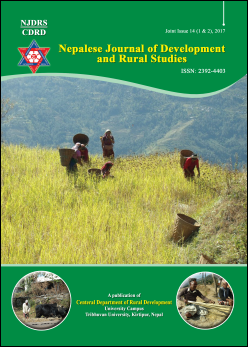Understanding Vikas: How Dalits Make Sense of Development in Rural Nepal
DOI:
https://doi.org/10.3126/njdrs.v14i1-2.19653Keywords:
Vikas, Development, Caste, Traditional values, Dalits, Rural and social changeAbstract
The experiences, views and opinions of the marginalized people have generally not been included in the development discourse, even though they supposedly are the beneficiaries of development. Dalits are not only marginalized but also untouchable in the Hindu caste hierarchy. Notion of 'untouchability' labeled the Dalits unique characters in their identity from which other castes do not suffer. This study explores the Dalits’ understanding on development. It shows that the meaning of development is contextual and Dalits understand it differently according to their age and educational background. Their understanding on development mostly refers to infrastructural, social, economic, human, cultural and political aspects of development. This study suggests a more culturally sensitive development practices that address/incorporate Dalits issues in a holistic way.
Nepalese Journal of Development and Rural Studies
Vol. 14 (Joint issue) (1&2), 2017, Page: 98-111
Downloads
Downloads
Published
How to Cite
Issue
Section
License
© Copyright by Central Department of Rural Development




